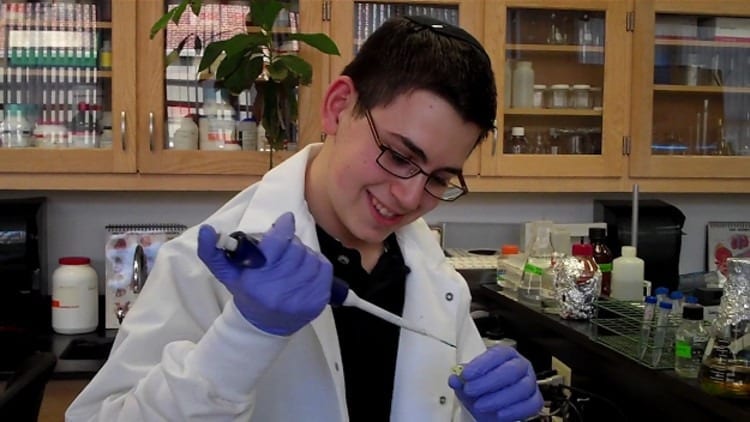
Provita, a company staffed entirely by kids under 18, is working on a project (with funding from the Gates Foundation) to use mosquitoes to help carry important vaccines.
Joshua Meier, CEO of biotechnology company Provita Pharmaceuticals, spends about 20 hours a week on research projects in the various labs at his disposal. In January, the company gave a presentation to the FDA on its work with the flying syringe, a tool that uses mosquitoes as a vector to deliver vaccines to those who need them. Provita has also submitted a grant idea to the Bill and Melinda Gates Foundation. But you might not recognize Meier as a CEO if you saw him walking down the street–he’s 16. In fact, everyone on the 15-plus person Provita team, from research and development workers to finance officers, is in high school.
Provita was founded in 2008, before Meier–a junior and a finalist in the 2012 Google Science Fair–entered high school at the Bergen County Academies, a group of seven magnet high school programs that each hone in on different subjects, including a program focused on science and technology (where Meier is a student), a business and finance program, and a medical science and technology program. Provita emerged when some of the science-focused kids decided to collaborate with the business-minded students on a business plan competition for their research.
The company’s first product, Coagula, aims to decrease the number of injections that patients with hemophilia and von Willebrand disease have to endure. “Hemopheliacs have uncontrolled bleeding, and they to have to take coagulants to make their blood thicker. The problem with treatment is that they have to take it several time a week, and there are issues of infection and having transfusions all the time,” explains Meier. “We came up with new method, so instead of taking treatment a few times a week, you do it once every few months. We’re still working on that.”
The Provita team certainly has enough equipment at its disposal, including a stem cell lab and a microbiology lab at the school. Memorial Sloan Kettering Cancer Center in New York City has even indicated interest in helping with future development.
More recently, Provita has started working on the flying syringe. That project is still in the very early stages. “We can’t really culture mosquitoes in the lab at our high school because that’s dangerous, but we a have research advisor and ideas planned out, and the next step is making a partnership, contacting other places that do have animal facilities,” says Meier.
The first goal: to genetically engineer mosquitoes so that they can produce and deliver a vaccine (via their saliva) for West Nile Virus. The mosquitoes, Meier explains, will be sterilized to prevent any out-of-control problems. It’s a new twist on research being done elsewhere to breed sterile mosquitoes in malaria-infested areas.
The Latest Bing News on:
West Nile Virus
- Houston ranks in top 10 nationally for most mosquitos. Here's how to avoid themon April 27, 2024 at 1:30 pm
Mosquito season is right around the corner, and Houston is one of the most infested cities in the country. Houston was ranked the seventh most mosquito-ridden city in the U.S., falling behind cities ...
- Tick-borne Powassan virus reported in Massachusetts: ‘The virus can invade the central nervous system’on April 27, 2024 at 12:50 pm
A confirmed case of the tick-borne Powassan virus has been reported in Massachusetts, according to officials who are warning residents to take precautions against the disease.
- Saturday Morning News Roundupon April 27, 2024 at 12:00 am
A board appointed by Gov. Gavin Newsom and the Legislature on Wednesday approved the new regulations in a 6-1 vote. Health and Human Secretary Dr. Mark Ghaly, who chairs the board, said the ...
- Bird found with West Nile Virus in Concordon April 26, 2024 at 6:51 pm
A dead bird in Concord has tested positive for West Nile virus. The Contra Costa Mosquito and Vector Control District said Friday an American crow was picked up with the virus April ...
- Region of Waterloo spreading pesticide to battle West Nile viruson April 26, 2024 at 10:40 am
The Region of Waterloo will use larvicide to control West Nile Virus by treating catch basins, sewage lagoons, ditches, and standing water between June 1 and Aug. 31.
- Bug season is about to start: Helicopter to drop mosquito larvicide on swamp in Westerlyon April 25, 2024 at 12:03 pm
Trying to reduce cases of mosquito-borne illnesses this summer, the town of Westerly will apply a mosquito larvicide to Chapman Swamp on Monday.
- Expect 'a huge emergence' of mosquitoes this May. What to knowon April 25, 2024 at 7:47 am
"This year will be tremendous for mosquitoes," said Telford. "As it warms up, with all the standing water there will be a huge emergence in May." April showers may bring May flowers, but they also ...
- West Nile virus cases jumped nearly 1,000% in Sacramento County last year. Here’s whyon April 24, 2024 at 5:00 am
West Nile virus also killed more people across Sacramento, Yolo, Placer and El Dorado counties last year than any of the previous 10 years, data show.
- County to Begin Annual Mosquito Larvicide Drops as Insect Season Arriveson April 24, 2024 at 12:30 am
County officials said helicopter larvicide drops will be done Wednesday, and Thursday if necessary, to cover nearly 1,400 acres of hard-to- reach potential mosquito breeding areas in 52 local ...
- 2 Tennessee cities among top 50 ‘mosquito infested’ cities in U.S.on April 18, 2024 at 9:25 am
A study conducted by Terminix identified the top 50 "mosquito infested" cities in the U.S., and two of them are in Tennessee.
The Latest Google Headlines on:
West Nile Virus
[google_news title=”” keyword=”West Nile Virus” num_posts=”10″ blurb_length=”0″ show_thumb=”left”]
The Latest Bing News on:
West Nile Virus vaccine
- Walega Was Key to Growth of Public Healthon April 25, 2024 at 5:02 am
When she fully retires on June 23 at age 66, she’ll be able to boast successfully guiding Marion and Rochester through 35 years of developments in the public-health landscape, from strengthening ...
- Nuggets 'The Average Joes' dancer shares West Nile survival story, urges others to be aware of symptomson April 23, 2024 at 2:03 pm
Jonathan Maness was a healthy active 42-year old until a mosquito bite sent him to the emergency room and paralyzed him for weeks.
- A warm winter may mean more ticks this year; here's how to stay safeon April 20, 2024 at 1:00 am
Lancaster County just had its fifth warmest winter on record, which could put its residents at higher risk of the tick-borne illness Lyme disease.
- County to conduct aerial mosquito-fighting larvicide drop next weekon April 17, 2024 at 2:13 pm
As we expect to see more mosquitoes with the temperatures getting warmer, the County of San Diego is preparing to prevent them from breeding and spreading disease.
- Should we be concerned about West Nile virus?on April 17, 2024 at 12:00 am
The biggest West Nile virus outbreak in the United States occurred right here in Arizona in the summer of 2021. Pima, Pinal and Maricopa counties reported 1,693 cases, and we ...
- Mosquitoes in Costa Rica: How to Stay Protectedon April 12, 2024 at 2:49 am
Should you worry about mosquitoes in Costa Rica? The short answer is, maybe. Mosquitoes in Costa Rica are known to carry a few different illnesses. However, the chances of getting one of these ...
- Dangerous disease-spreading mosquitoes detected in Santa Clara Countyon April 11, 2024 at 5:14 pm
The invasive mosquito was found in the East San Jose foothills. Residents in the area are being asked to dump standing water on their properties so that the mosquito can't breed.
The Latest Google Headlines on:
West Nile Virus vaccine
[google_news title=”” keyword=”West Nile Virus vaccine” num_posts=”10″ blurb_length=”0″ show_thumb=”left”]








